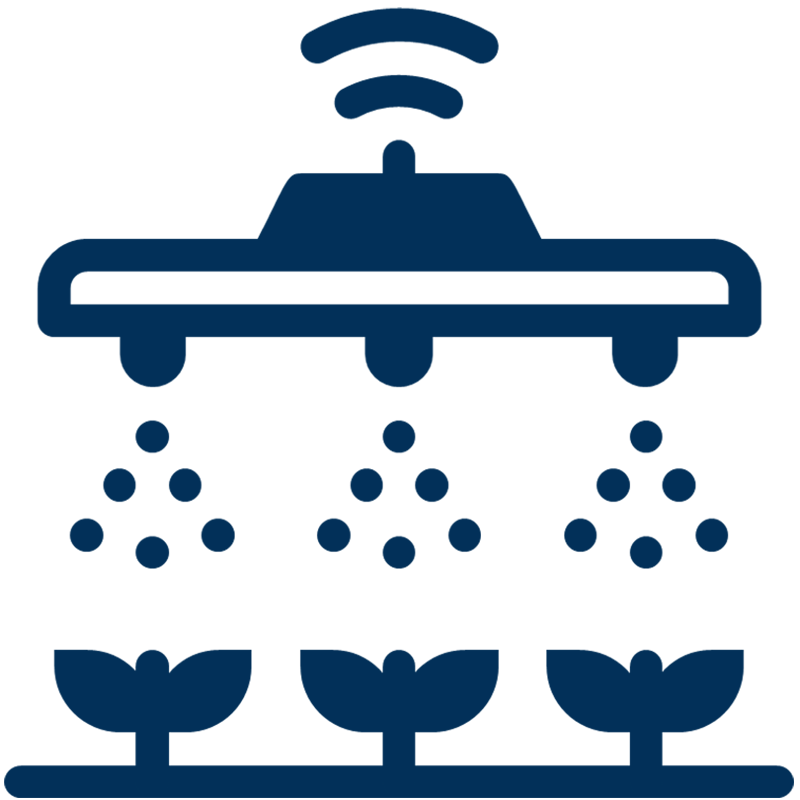
Smart Irrigation
Smart irrigation systems tailor watering schedules and run times automatically based on weather conditions to meet specific agricultural or landscaping objectives. These Controllers significantly improve outdoor water use efficiencies. Unlike traditional irrigation Controllers that operate on a preset programmed schedule and timers, smart irrigation Controllers monitor weather, soil conditions, evaporation and plant water use to automatically adjust the watering schedule to actual conditions of the site. For example, as outdoor temperatures increase or rainfall decreases, smart irrigation Controllers consider on site-specific variables, such as soil type, and the sprinklers’ application rate to adjust watering schedules.
Water Efficiency: Smart Irrigation systems optimize water usage by delivering the right amount of water to plants based on real-time environmental conditions such as soil moisture, weather forecasts, and plant requirements. This helps businesses conserve water resources and reduce water wastage.
Cost Savings: By minimizing water usage and reducing labor costs associated with manual irrigation management, Smart Irrigation systems lead to significant cost savings for businesses. Additionally, the prevention of overwatering helps prevent plant diseases and reduces the need for chemical treatments, further lowering operational costs.
Farmers and Landscapers: Farmers and landscapers benefit from Smart Irrigation by improving crop yield, reducing water consumption, and minimizing manual labor. They view Smart Irrigation as a sustainable and efficient solution to address water scarcity challenges and enhance agricultural productivity.
Environmental Agencies and Policymakers: Environmental agencies and policymakers advocate for the adoption of Smart Irrigation technologies to promote water conservation, protect natural resources, and mitigate the impacts of climate change. They support initiatives that incentivize the adoption of Smart Irrigation practices through regulations, subsidies, and educational programs.
IoT Sensors: IoT sensors, including soil moisture sensors, weather stations, and plant sensors, collect real-time data on environmental conditions and plant health. These sensors transmit data wirelessly to a centralized control system for analysis and decision-making.
Automation and Control Systems: Smart Irrigation systems utilize automation and control systems to adjust irrigation schedules, control water flow, and optimize watering patterns based on sensor data and predefined algorithms. This automation reduces manual intervention and improves irrigation efficiency.
Sensor Data: Smart Irrigation systems rely on sensors installed in the soil, weather stations, and plant monitoring devices to collect real-time data on soil moisture, temperature, humidity, rainfall, and other environmental factors. This data helps optimize irrigation schedules and watering patterns.
Data Analytics: Advanced data analytics techniques are used to analyze sensor data, identify patterns, and generate actionable insights for irrigation management. Predictive analytics models can forecast soil moisture levels and predict irrigation requirements based on historical data and weather forecasts.
Sensor Deployment: Smart Irrigation systems deploy sensors strategically across fields or landscapes to collect accurate and reliable data on soil moisture and environmental conditions. These sensors are connected to a centralized control system for real-time monitoring and management.
Integration with Irrigation Infrastructure: Smart Irrigation systems integrate with existing irrigation infrastructure such as sprinkler systems, drip irrigation systems, or pivot systems. This integration enables automated control and adjustment of irrigation schedules based on sensor data and user preferences.




